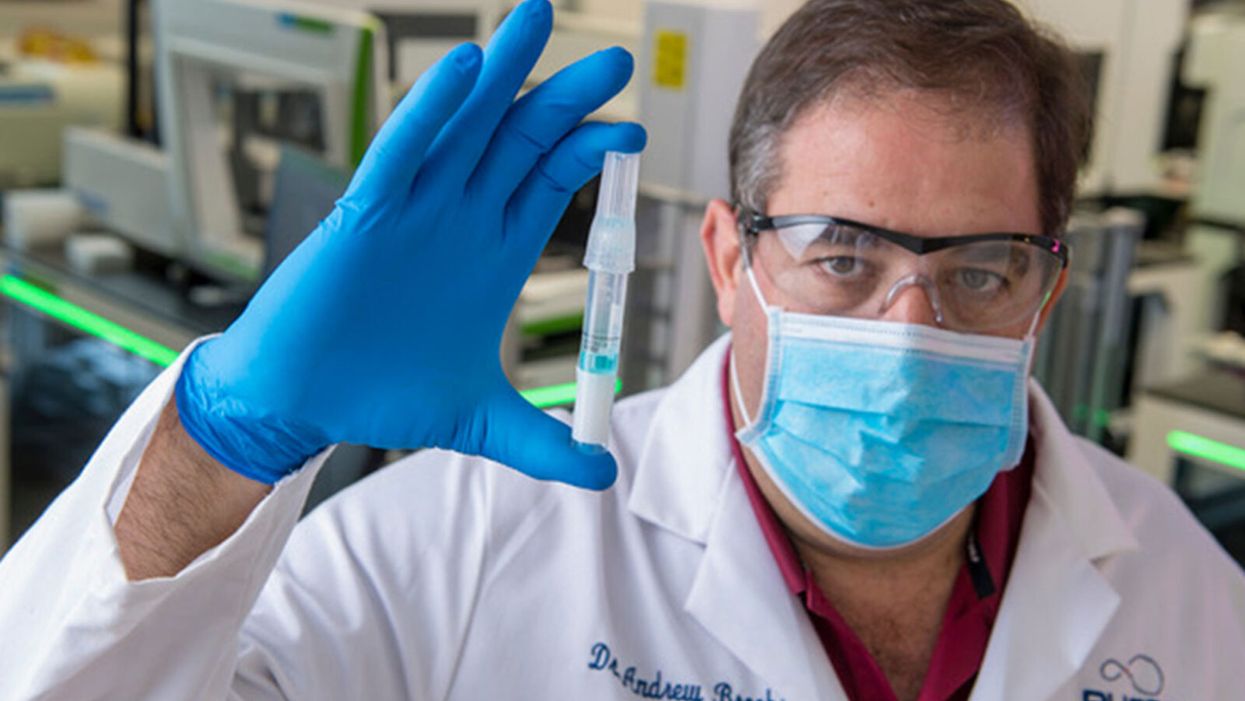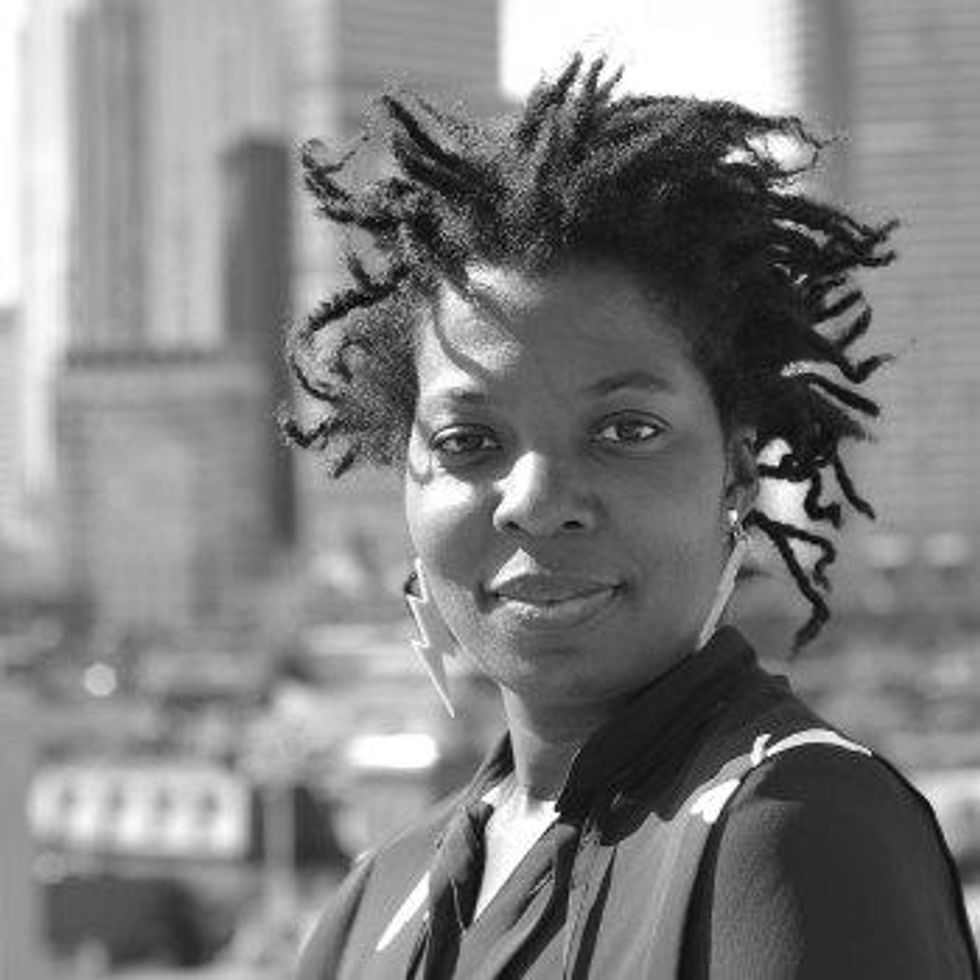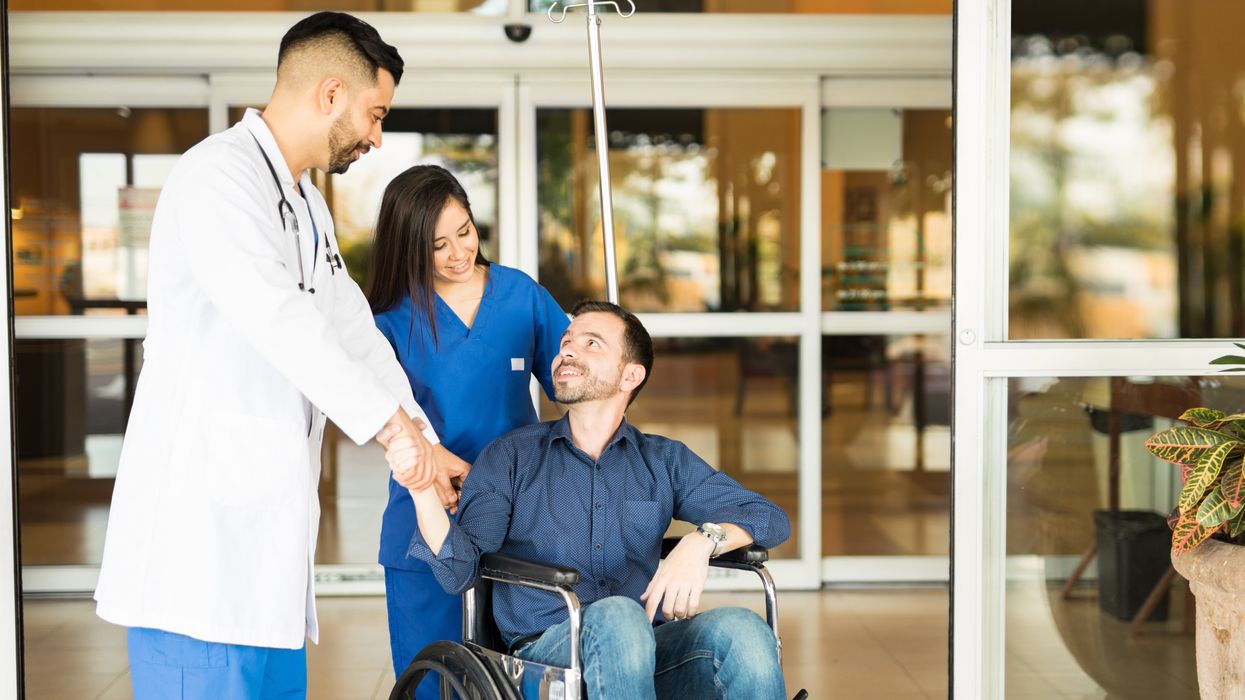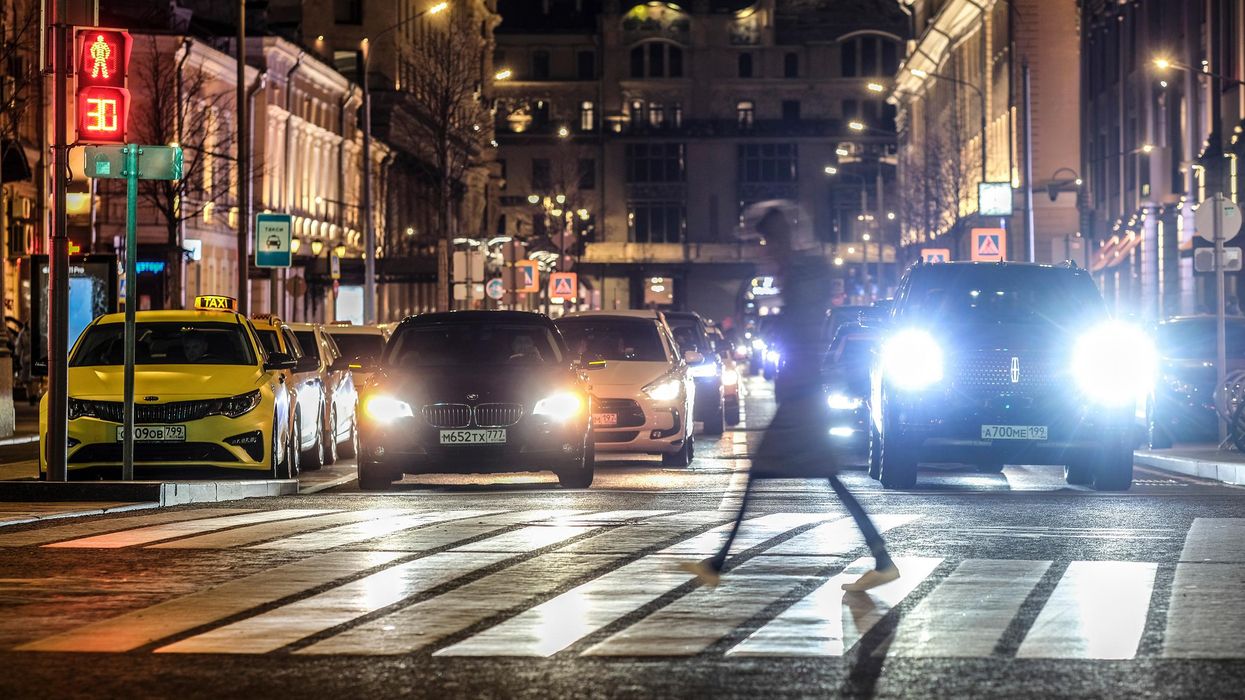Saliva Testing Offers Easier and Earlier Detection of COVID-19

Dr. Andrew Brooks of RUCDR Infinite Biologics holds up a saliva sample.
The patient tilts back her head and winces as the long swab stick pushes six inches up her nose. The tip twirls around uncomfortably before it's withdrawn.
"Our saliva test can detect the virus in asymptomatic and pre-symptomatic cases."
A gloved and gowned healthcare worker wearing a face shield and mask tells the patient that she will learn whether she is positive for COVID-19 as soon as the lab can process her test.
This is the typical unpleasant scenario for getting a coronavirus test. But times are rapidly changing: Today, for the first time, the U.S. Food and Drug Administration cleared one company to sell saliva collection kits for individuals to use at home.
Scientists at the startup venture, RUCDR Infinite Biologics at Rutgers University in New Jersey, say that saliva testing offers an easier, more useful alternative to the standard nasal swab.
"Our saliva test can detect the virus in asymptomatic and pre-symptomatic cases," said Dr. Andrew Brooks, chief operating officer at RUCDR.
Another venture, Darwin BioSciences in Colorado, has separately developed an innovative method of testing saliva for the coronavirus that causes COVID-19.
Saliva testing can allow earlier detection to identify people who may not know they are contagious, say scientists at both companies. In addition, because patients spit into a tube or cup, saliva testing is safer for healthcare workers than taking swabs. This frees up scarce personal protective equipment (PPE) for use elsewhere. Nasal swabs themselves have been in scarce supply.
Saliva testing, if it becomes widespread, potentially could mean opening society sooner. The more ubiquitous testing becomes across the population, experts say, the more feasible it becomes for public health officials to trace and isolate contacts, especially of asymptomatic cases. Testing early and often will be essential to containing emerging hot spots before a vast outbreak can take root.
Darwin Biosceiences is preparing to seek an FDA Emergency Use Authorization (EUA) this month for its patented "CoVScreen" testing system, which potentially could be available to labs nationally by mid-summer.
Meanwhile, Infinite Biologics will now begin selling kits to consumers for home collection, upon order by a physician. The FDA said that the company's saliva test was as accurate as the nasal swab method used by health care professionals. An FDA summary documenting the company's data reported: "There was 100% positive and negative agreement between the results obtained from testing of saliva and those obtained from nasopharyngeal and oropharyngeal swabs."
The greatest scientific advantage, said Dr. Brooks, is that nasal and oral swabs only collect the surface area where the swab goes, which may not be the place with most viral load. In contrast, the virus occurs throughout a saliva sample, so the test is more trustworthy.
The lab at Rutgers can process 20,000 tests a day, with a 48-hour turnaround. They have 75,000 tests ready to ship now.
The Leap: Detecting Sickness Before You Feel It
"We wanted to create a device that could detect infections before symptoms appeared," explained Nicholas Meyerson, co-founder and CEO of Darwin.
For more than 300 years, he said, "the thermometer was the gold standard for detecting disease because we thought the first sign of illness was a fever. This COVID-19 pandemic has proven that not all pathogens cause a fever. You can be highly contagious without knowing it."
"The question is whether we can scale up fast enough to meet the need. I believe saliva testing can help."
Therefore, Meyerson and co-founder Sara Sawyer from the University of Colorado began to identify RNA biomarkers that can sense when a pathogen first enters a molecule and "sets off alarms." They focused on the nucleic acids concentrated in saliva as the best and easiest place to collect samples for testing.
"The isothermal reaction in saliva takes place at body or room temperature," he said, "so there's no need for complicated testing machinery. The chemical reaction can be read out on a paper strip, like a pregnancy test -- two stripes if you're sick, and one stripe if you're okay."
Before the pandemic, limited but successful human trials were already underway at CU in Boulder and at the CU Anschutz Medical Campus east of Denver. "This was our proof of concept," he said.
Darwin was founded in March and has secured enough venture capital to concentrate protype development on detecting the virus causing COVID-19. So far, said Meyerson, "Everything works."
A small double-blind test of 30 samples at CU produced 100 percent accuracy. "I'm not sure if that will hold true as we go into clinical trials," he said, "but I'm confident we will satisfy all the requirements for at least 95 percent clinical validation."
The specific "CoVStick" test strips will roll out soon, he said: "We hope before the second wave of the pandemic hits."
The broader saliva test-strip product from Darwin, "SickStick," is still one to two years away from deployment by the military and introduction into the consumer drugstore market for home use, said Meyerson. It will affordably and quickly detect a range of viral and bacterial infections.

An illustration of the "CoVStick."
(Darwin Biosciences)
A Potential Game Changer
Society needs widespread testing daily, said George Church, founding core faculty of the Wyss Institute for Biologically Inspired Engineering at Harvard University. Speaking at an online SynBioBeta webinar in April, he urged developing stockpiles of testing kits for home use.
As for any potential of false positives, Church said a much bigger risk is not having enough tests.
"Saliva testing is going to speed up the timeline for opening society a lot," said Meyerson. "People need to self-collect samples at home. A lot more people are going to be willing to spit into a tube than to push a swab six inches up their own nose."
Brooks, of Rutgers, addressed the big picture. "It's critical that we open society as soon as possible to minimize the economic impact of the pandemic. Testing is the surest and safest path. The question is whether we can scale up fast enough to meet the need. I believe saliva testing can help."
Scientists use AI to predict how hospital stays will go
In this week's Friday Five, research on the best time to wrap up eating for the night, how to use AI to predict how hospital stays will go, a new way to armor the shields of our livers against cancer, super neurons in super agers - and much more.
The Friday Five covers five stories in research that you may have missed this week. There are plenty of controversies and troubling ethical issues in science – and we get into many of them in our online magazine – but this news roundup focuses on scientific creativity and progress to give you a therapeutic dose of inspiration headed into the weekend.
Here are the promising studies covered in this week's Friday Five:
- The problem with bedtime munching
- Scientists use AI to predict how stays in hospitals will go
- How to armor the shields of our livers against cancer
- One big step to save the world: turn one kind of plastic into another
- The perfect recipe for tiny brains
And an honorable mention this week: Bigger is better when it comes to super neurons in super agers
The Toxic Effects of Noise and What We’re Not Doing About It
Our daily soundscape is a cacophony of earsplitting jets, motorcycles, and construction sites. Engineers know how to eliminate and control noise, but other countries are ahead of the U.S. when it comes to keeping the quiet - with related health benefits.
Erica Walker had a studio in her Brookline, Mass. apartment where she worked as a bookbinder and furniture maker. That was until a family with two rowdy children moved in above her.
The kids ran amuck, disrupting her sleep and work. Ear plugs weren’t enough to blot out the commotion. Aside from anger and a sense of lost control, the noise increased her heart rate and made her stomach feel like it was dropping, she says.
That’s when Walker realized that noise is a public health problem, not merely an annoyance. She set up her own “mini study” on how the clamor was affecting her. She monitored sound levels in her apartment and sent saliva samples to a lab to measure her stress levels.
Walker ultimately sold her craft equipment and returned to school to study public health. Today she is assistant professor of epidemiology and director of the Community Noise Lab at the Brown University School of Public Health. “We treat noise like a first world problem—like a sacrifice we should have to make for modern conveniences. But it’s a serious environmental stressor,” she asserts.
Our daily soundscape is a cacophony of earsplitting jets, motorcycles, crying babies, construction sites or gunshots if you’re in the military. Noise exposure is the primary cause of preventable hearing loss. Researchers have identified links between excessive noise and a heightened risk of heart disease, metabolic disorders, anxiety, depression, sleep disorders, and impaired cognition. Even wildlife suffers. Blasting oil drills and loud shipping vessels impede the breeding, feeding and migration of whales and dolphins.
At one time, the federal government had our back… and our ears. Congress passed the Noise Control Act in 1972. The Environmental Protection Agency set up the Office of Noise Abatement and Control (ONAC) to launch research, explore solutions and establish noise emission standards. But ONAC was defunded in 1981 amidst a swirl of antiregulatory sentiment.
Impossibly Loud and Unhealthy
Daniel Fink. a physician, WHO consultant, and board chair of The Quiet Coalition, a program of the nonprofit Quiet Communities, likens the effect of noise to the invisible but cumulative harm of second-hand smoke. About 1 in 4 adults in the U.S. who report excellent to good hearing already have some hearing loss. The injury can happen after one loud concert or from years with a blaring TV. Some people are more genetically susceptible to noise-related hearing loss than others.
“People say noise isn’t a big deal but it bothers your body whether you realize it or not,” says Ted Rueter, director of Noise Free America: A Coalition to Promote Quiet. Noise can chip away at your ears or cardiovascular system even while you’re sleeping. Rueter became a “quiet advocate” while a professor at UCLA two decades ago. He was plagued by headaches, fatigue and sleep deprivation caused by the hubbub of Los Angeles, he says.
The louder a sound is, and the longer you are exposed to it, the more likely it will cause nerve damage and harmful fluid buildup in your inner ear. Normal speech is 50-60 decibels (dBs). The EPA recommends that 24-hour exposure to noise should be no higher than 70 weighted decibels over 24 hours (weighted to approximate how the human ear perceives the sound) to prevent hearing loss but a 55 dB limit is recommended to protect against other harms from noise, too.
The decibel scale is logarithmic. That means 80 dB is 10 times louder than 70 dB. Trucks and motorcycles run 90 dBs. A gas-powered leaf blower, jackhammer or snow blower will cost you 100 dBs. A rock concert is in the 110 dB range. Aircraft takeoffs or sirens? 120 dBs.
Walker, the Brown professor, says that sound measurements often use misleading metrics, though, because they don’t include low frequency sound that disturb the body. The high frequency of a screeching bus will register in decibels but the sound that makes your chest reverberate is not accounted for, she explains. ‘How loud?’ is a superficial take when it comes to noise, Walker says.

After realizing the impact of noise on her own health, Erica Walker was inspired to change careers and become director of the Community Noise Lab at the Brown University School of Public Health.
Erica Walker
Fink adds that the extent to which noise impairs hearing is underestimated. People assume hearing loss is due to age but it’s not inevitable, he says. He cites studies of older people living in quiet, isolated areas who maintain excellent hearing. Just like you can prevent wrinkles by using sunscreen, you can preserve hearing by using ear plugs when attending fireworks or hockey games.
You can enable push notifications on a Smart Watch to alert you at a bar exceeding healthy sound levels. Free apps like SoundPrint, iHEARu, or NoiseTube can do decibel checks, too, but you don’t need one, says Fink. “If you can’t carry a conversation at normal volume, it’s too loud and your auditory health is at risk,” he says.
About 40 million U.S. adults, ages 20-69, have noise-induced hearing loss. Fink is among them after experiencing tinnitus (ringing or buzzing in the ears) on leaving a raucous New Year’s Eve party in 2007. The condition is permanent and he wears earplugs now for protection.
Fewer are aware of the link between noise pollution and heart disease. Piercing noise is stressful, raising blood pressure and heart rate. If you live near a freeway or constantly barking dog, the chronic sound stress can trigger systemic inflammation and the vascular changes associated with heart attacks and stroke.
Researchers at Rutgers University’s Robert Wood Johnson Medical School, working with data from the state’s Bureau of Transportation, determined that 1 in 20 heart attacks in New Jersey during 2018 were due to noise from highways, trains and air traffic. That’s 800 heart attack hospitalizations in the state that year.
Another study showed that incidence of hypertension and hardening arteries decreased during the Covid-19 air lockdown among Poles in Krakow routinely exposed to aircraft noise. The authors, comparing their pre-pandemic 2015 results to 2020 data, concluded it was no coincidence.
Mental health takes a hit, too. Chronic noise can provoke anxiety, depression and violence. Cognitively, there is ample evidence that noise disturbance lowers student achievement and worker productivity, and hearing loss among older people can speed up cognitive decline.
Noise also contributes to health disparities. People in neighborhoods with low socioeconomic status and a higher percentage of minority residents bear the brunt of noise. Affluent people have the means to live far from airports, factories, and honking traffic.
Out, Out, Damn Noise
Europe is ahead of the U.S. in tackling noise pollution. The World Health Organization developed policy guidelines used by the European Environment Agency to establish noise regulations and standards, and progress reports are issued.
Americans are relying too much on personal protective equipment (PPE) instead of eliminating or controlling noise. The Centers of Disease Control and Prevention rank PPE as the least useful response. Earplugs and muffs are effective, says Walker, but these devices are “a band-aid on a waterfall.”
Editing out noise during product design is the goal. Engineers have an arsenal of techniques and know-how for that. The problem is that these solutions aren’t being applied.
A better way to lower the volume is by maintaining or substituting equipment intended for common use. Piercing building alarms can be replaced with visual signals that flash alerts. Clanking chain and gear drives can be swapped out with belt drives. Acoustical barriers can wall off highway noise. Hospitals can soften beeping monitors and limit loudspeaker blasts. Double paned windows preserve quiet.
Editing out noise during product design is the goal. Engineers have an arsenal of techniques and know-how for that. The problem is that these solutions aren’t being applied, says Jim Thompson, an engineer and editor of the Noise Control Engineering Journal, published by the Institute of Noise Control Engineering of the USA
Engineers have materials to insulate, absorb, reflect, block, seal or diffuse noise. Building walls can be padded. Metal gears and parts can be replaced with plastic. Clattering equipment wheels can be rubberized. In recent years, building certifications such as LEED have put more emphasis on designs that minimize harmful noise.
Walker faults urban planners, too. A city’s narrow streets and taller buildings create a canyon effect which intensifies noise. City planners could use bypasses, rerouting, and other infrastructure strategies to pump down traffic volume. Sound-absorbing asphalt pavement exists, too.
Some municipalities are taking innovative measures on their own. Noise cameras have been installed in Knoxville, Miami and New York City this year and six California cities will join suit next year. If your muffler or audio system registers 86 dB or higher, you may receive a warning, fine or citation, similar to how a red-light camera works. Rueter predicts these cameras will become commonplace.
Based on understanding how metabolic processes affect noise-induced hearing loss in animal models, scientists are exploring whether pharmacological interventions might work to inhibit cellular damage or improve cellular defenses against noise.
Washington, DC, and the University of Southern California have banned gas-powered leaf blowers in lieu of quieter battery-powered models to reduce both noise and air pollution. California will be the first state to ban the sale of gas-powered lawn equipment starting 2024.
New York state legislators enacted the SLEEP (Stop Loud and Excessive Exhaust Pollution) Act in 2021. This measure increases enforcement and fines against motorists and repair shops that illegally modify mufflers and exhaust systems for effect.
“A lot more basic science and application research is needed [to control noise],” says Thompson, noting that funding for this largely dried up after the 1970s. Based on understanding how metabolic processes affect noise-induced hearing loss in animal models, scientists are exploring whether pharmacological interventions might work to inhibit cellular damage or improve cellular defenses against noise.
Studying biochemical or known genetic markers for noise risk could lead to other methods for preventing hearing loss. This would offer an opportunity to identify people with significant risk so those more susceptible to hearing loss could start taking precautions to avoid noise or protect their ears in childhood.
These efforts could become more pressing in the near future, with the anticipated onslaught of drones, rising needs for air conditioners, and urban sprawl boding poorly for the soundscape. This, as deforestation destroys natural carbon absorption reservoirs and removes sound-buffering trees.
“Local and state governments don’t have a plan to deal with [noise] now or in the future,” says Walker. “We need to think about this with intentionality.”

